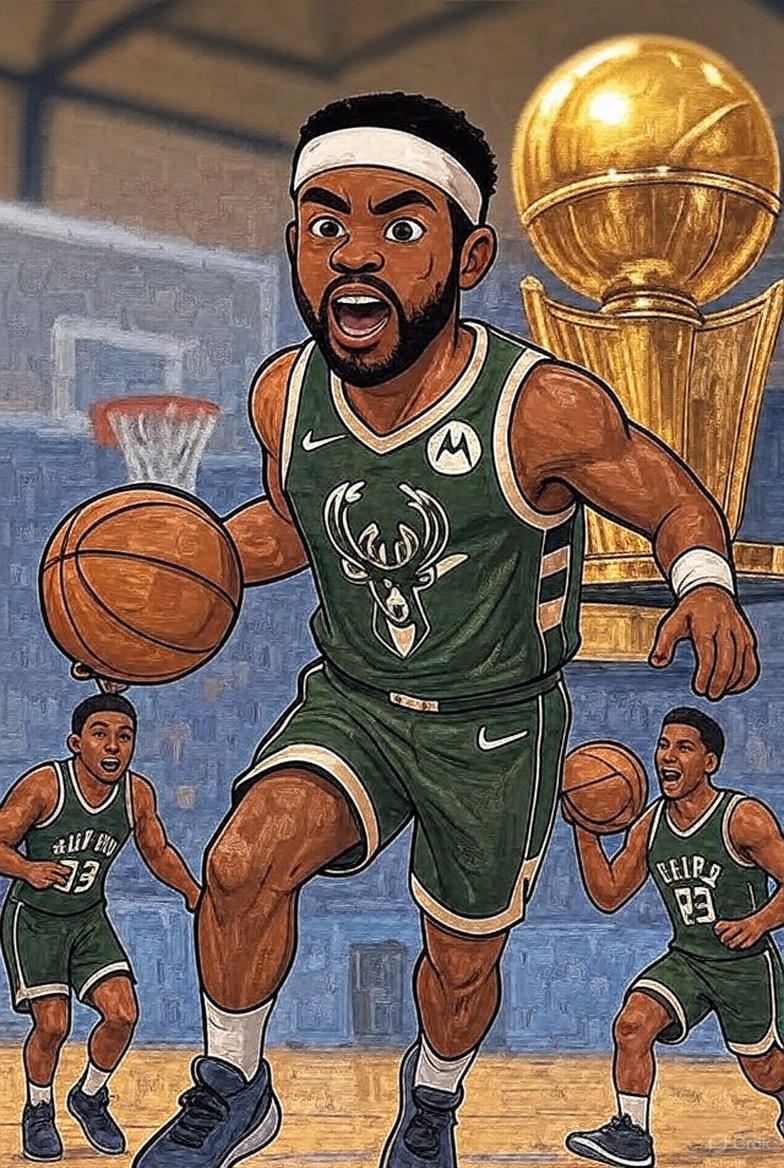As the Bucks navigate inconsistent playoff performances and mounting pressure to reclaim a title in 2025, questions linger about whether Giannis is the ideal leader to carry Milwaukee to another championship. While his on-court dominance is undeniable, leadership and team cohesion issues—both real and perceived—raise concerns about his ability to guide the Bucks to their ultimate goal.
Giannis’ Leadership Style: Passion or Pressure?
Giannis’ leadership is defined by intensity and authenticity. He’s vocal, often seen rallying teammates during timeouts or taking accountability in post-game press conferences. His work ethic sets a high bar, and he’s known for pushing teammates to match his drive. However, this approach can be a double-edged sword. Some reports suggest that his relentless demands for effort can create tension, particularly with veterans or players less inclined to embrace his all-in mentality. For instance, former teammate Jrue Holiday, a key piece of the 2021 championship, was traded in 2023 partly due to roster upgrades but also amid whispers of differing team dynamics. Could Giannis’ intensity alienate players who don’t share his singular focus?
Leadership in the NBA isn’t just about setting an example; it’s about fostering unity. Giannis’ public comments, like his candid remarks about needing “everybody on the same page” after playoff disappointments, hint at underlying cohesion issues. While his honesty is refreshing, it can also spotlight fractures within the locker room. Compare this to leaders like LeBron James or Stephen Curry, who balance accountability with diplomacy, ensuring teammates feel empowered rather than criticized. Giannis’ raw, unfiltered style may inspire some but risks isolating others, especially in high-stakes playoff moments where emotional intelligence is as critical as talent.
Team Cohesion: The Bucks’ Achilles’ Heel?
Milwaukee’s roster, built around Giannis, is talented but complex. Damian Lillard’s arrival in 2023 was meant to create a championship-caliber duo, yet the Bucks have struggled to gel. In the 2024 playoffs, injuries to Giannis and Lillard exposed a lack of cohesion, with the team faltering against Indiana in the first round. While injuries aren’t Giannis’ fault, leadership is tested in adversity. Critics argue he hasn’t fully bridged the gap between his game-dominating style and a cohesive team identity. The Bucks’ offense often feels like “Giannis plus shooters,” lacking the fluidity of teams like the Boston Celtics, where Jayson Tatum orchestrates a more collective attack.
Data backs this up: in the 2024-25 season, the Bucks rank in the top 10 for offensive efficiency but lag in assist-to-turnover ratio, suggesting less ball movement than elite offenses. Giannis, while an improved passer, still prioritizes drives to the rim, which can stagnate the offense when defenses collapse on him. A true leader elevates teammates’ strengths, but Lillard’s inconsistent integration—averaging fewer points and assists than in Portland—raises questions about whether Giannis is doing enough to empower his co-star. Leadership isn’t just about scoring 30 points; it’s about making the team greater than the sum of its parts.
All too often it feels like all Giannis cares about is his personal statistics. When the going gets tough he either tries to get rid of the ball and responsibilities or he does the same two moves that everybody expects.
The Playoff Pressure Cooker
Playoff failures amplify scrutiny on Giannis’ leadership. Since 2021, the Bucks have exited early in three of four postseasons, including a 2023 first-round upset to Miami. Giannis’ infamous “there’s no failure in sports” press conference after that loss was polarizing—some saw it as mature perspective, others as a deflection of accountability. Leaders like Michael Jordan or Kobe Bryant embraced pressure, using setbacks as fuel. Giannis’ mindset, while mentally healthy, can come off as lacking the killer instinct needed to rally a team through playoff adversity.
Moreover, his game has exploitable flaws. His limited shooting range (29% from three in 2024-25) allows defenses to clog the paint, daring him to shoot. While he’s improved his midrange and free-throw shooting, playoff opponents like Toronto (2019) and Miami (2020, 2023) have exposed this weakness. A leader adapts, but Giannis’ reluctance to diversify his offensive game can put teammates in tough spots, forcing them to compensate for predictable strategies. Compare this to Nikola Jokić, whose versatility creates opportunities for Denver’s role players, enhancing team cohesion.
Giannis is not young—31 in 2025— and doesn’t seem to be evolving as a leader. In fact he doesn’t seem to be evolving at all. His loyalty to Milwaukee, signing a max extension in 2023, shows commitment rare in today’s NBA. He’s also taken steps to improve, like refining his playmaking and engaging in film study to better read defenses. But it is not translating on to something actionable on the court.
The Bucks’ struggles aren’t solely on Giannis. Coaching changes (three head coaches since 2021) and roster turnover disrupt continuity. Injuries, particularly to Middleton and Giannis himself, have derailed playoff runs. Front-office decisions, like trading Holiday for Lillard, shift dynamics beyond Giannis’ control. Expecting him to be both superstar and perfect leader seems way beyong his abilities.
Can Giannis Lead Milwaukee to Another Title?
Giannis’ style—intense, unfiltered, and sometimes rigid—may not fully align with the nuanced demands of championship leadership. His inability to consistently elevate teammates, coupled with on-court limitations, raises valid concerns about team cohesion. The modern NBA demands adaptability and emotional finesse, areas where Giannis is not growing.
For Milwaukee to reclaim a championship, Giannis must evolve beyond being the team’s engine. He needs to foster a culture where stars thrive, role players feel empowered, and playoff strategies diversify. The Bucks’ front office must also provide stability, but as the face of the franchise, Giannis bears the weight of leadership. Until then, doubts about his ability to unify and elevate the Bucks will linger. And this season it is even worse. It really seems as if he likes the narrative that he alone is worth anything on the roster. That is a selfish way to pretend to be a leader.

Leave a Reply